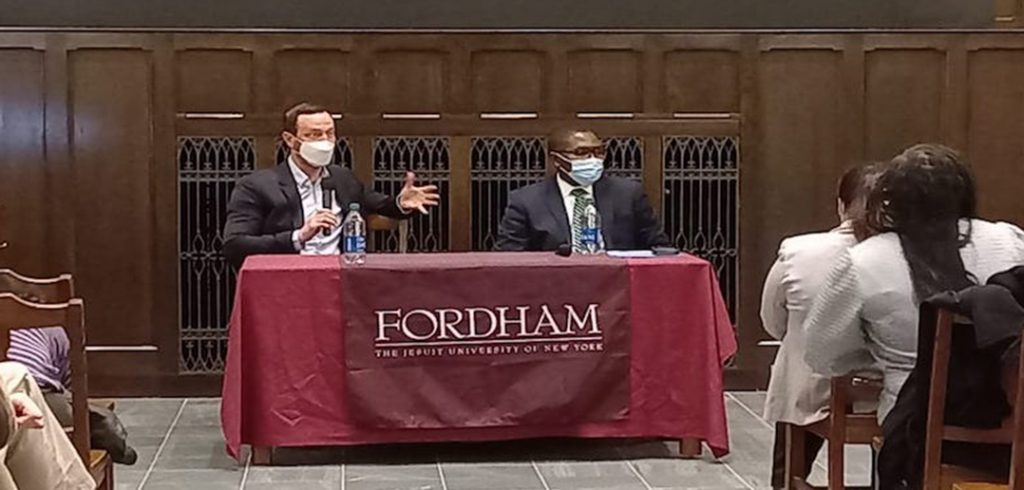Selwin Hart, special adviser to the secretary-general on climate action and assistant secretary-general for the Climate Action Team at the United Nations, addressed students and staff about the recent developments in climate negotiations at the 2021 UN Climate Change Conference (COP 26) held in Glasgow from Oct. 31 to Nov. 12 of this year.
Hart, a 2000 graduate of the Fordham IPED program, offered his thoughts on how the world must act in the face of the pandemic recovery and worsening climate crisis.
“Geopolitical tensions point to confrontation, competition, and potential conflict at a time when collaboration, cooperation, and solidarity are needed more than ever to ensure an inclusive recovery and to address the climate crisis,” he said.
Hart was the Cassamarca Lecturer at the “Climate Change and UN Call to Action” event delivered in Tognino Hall. The event was hosted by Fordham’s Graduate Program in International Political Economy and Development (IPED) and co-sponsored by Fordham Students for Environmental Awareness and Justice.
Hart said that at the Glasgow climate negotiations—the most consequential climate negotiations since the Paris Agreement was signed in 2015—efforts were made to create multilateral agreements focused on addressing key issues concerning climate change.
The first goal from the conference was to keep the 1.5°C of warming goal within reach, which is the warming threshold agreed upon by most climate experts needed to avoid catastrophic damages from climate change. In other words, the world needs to limit greenhouse gas emissions such as carbon dioxide—the cause of rising temperatures—in order to limit the rise in Earth’s temperature to only 1.5 °C.
“The 1.5 °C goal is alive, but it is on life support, it will depend on what happens this decade, and more importantly in the next two to three years,” he said,
The second goal was to have developed countries deliver on their commitment to supporting emerging economies with $100 billion in climate financing, which Hart said should be completed by 2023. The third and final goal was to develop support for countries that are already facing climate impacts. An agreement was made on this front to double climate adaptation funding by 2025.
Hart said that the U.S. and China issued a joint statement at the conference committing to work together on climate-related actions, which he noted is substantial given the current geopolitical tensions.
Hart remains optimistic about the progress made at the negotiations, but he knows that challenges lie ahead.
“Multilateralism is at a crossroads; for multilateralism to be effective it needs the support and leadership of the largest players like the U.S. and China, but the voices of the smallest players in the international community also must be heard. It is imperative that they are heard and not sacrificed.”
Coming from the small island nation of Barbados, Hart has a unique perspective on these issues. He explained the triumph of the small island states, who, with the U.N., were part of initial the coalition to push for the 1.5 °C warming goal, and through the tools and levers of multilateralism, were able to successfully advocate and advance it.
Hart gave his warm appreciation to IPED Director Henry Schwalbenberg, Ph.D., who, over 20 years ago, offered Hart a fellowship to study at Fordham, which he says launched his career. Since then, Hart has been a chief climate change negotiator for Barbados as well as the ambassador of Barbados to the United States, prior to being appointed to his current U.N. position.
To bring the discussion closer to home, Marc Conte, Ph.D., of the Fordham Department of Economics delivered remarks on climate and climate action within the United States. He highlighted the importance of information in future actions and argued that if we do not have the correct information, or if real estate and other commodities are not indicative of perfect information, we will not be able to treat the climate crisis with the urgency it deserves. He pointed to the example of multimillion-dollar properties still being sold on Florida waterfronts, even with the threat of sea-level rise.
He also connected the issue to health.
“If we had more information about these benefits and costs to society of adverse health outcomes, we might be more willing to contribute and collaborate,” he said, adding that the U.S. can and should be a global leader in climate, as it has been the biggest cumulative emitter of greenhouse gases throughout history.
In closing, Hart connected the discussion on multilateralism with climate action by saying we should “try hard at all times to understand, in the true Fordham style, the perspectives and views of those that are across the table. There is always hope for finding common ground.” He emphasized that while progress is incremental, he still believes we can solve the climate crisis.
–Kevin Strohm

